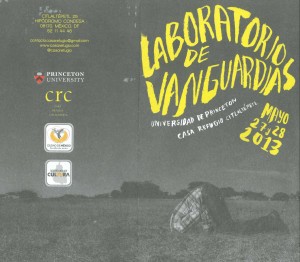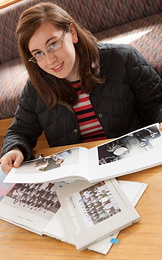Category Archives: Uncategorized
In Mount Laurel, Massey finds affordable-housing model
Video feature: The Teaching Museum
The Princeton University Art Museum since its founding in the late 1800s has aimed to provide students with exposure to original works of art and to teach the history of art through the many objects they have from around the world. Princeton University faculty members use objects in the museum as teaching tools to give students a deeper understanding of ancient cultures and people.
Last semester, Christina Halperin, then a Cotsen Fellow in Latin American Studies and now a lecturer in the art and archaeology department, taught a course titled “Mesoamerican Material Culture.” In this video, students in the course study ancient Maya artifacts in the museum and then reproduce Mesoamerican pottery techniques in the Wilson College Ceramics Studio on campus.
Class snapshot: ‘Health and the Social Markers of Difference’
Description: This new course examines the role of social markers of difference — such as race, class, nationality and gender — in issues of global health. For example: How can racial or gender discrimination affect access to health services and life expectancy? “Studying health paired with markers of difference lets us address the social and political determinants of vulnerability and disease,” said João Biehl, the Susan Dod Brown Professor of Anthropology, who helped develop the course. “It is somewhere in the middle of social lives that the work of critique always begins, and we need integrated approaches that recognize the profound interdependence of health, economic development, good governance and human rights,” said Biehl, who is also co-director of the Program in Global Health and Health Policy.
Instructors: Peter Locke, a lecturer in the Woodrow Wilson School of Public and International Affairs; Lilia Moritz Schwarcz, a professor of anthropology at the University of São Paulo (USP) and a Princeton Global Scholar; Laura Moutinho, a professor of anthropology at USP; José Ricardo Ayres, a professor of preventative medicine at USP; and Didier Fassin, the James D. Wolfensohn Professor at the Institute for Advanced Study. “Collaborating with our colleagues from the University of São Paulo has affirmed how essential it can be to explore complex issues from the vantage point of different intellectual traditions and social and historical contexts,” Locke said. “As we constructed the syllabus, the faculty from USP challenged us to broaden our sense of what materials could be relevant and to bring literatures and scholarly debates produced in other parts of the world into an equal conversation with our own bodies of knowledge.”
Pedro Meira Monteiro Awarded Prize
Former PLAS Fellow Gabriel Negretto Publishes “Making Constitutions”
Former PLAS Fellow Gabriel Negretto has just published a new book, Making Constitutions: Presidents, Parties, and Institutional Choice in Latin America (New York: Cambridge University Press, 2013. See the link below for more info:
http://ebooks.cambridge.org/ebook.jsf?bid=CBO9781139207836
Graduate Students Travel to Mexico
Written by Miguel Caballero
 On May 27-28, 2013 Laboratorio de vanguardias de la Universidad de Princeton was held at Casa Refugio Citlaltépetl, in Mexico City. Hosted by Philippe Ollé-Laprune and presented by Professor Rubén Gallo, this laboratory was a platform for a group of nine Princeton PhD students to discuss their research in process on Latin American and Iberian avant-gardes with writers, artists, and an academic and nonacademic audience. Continue reading
On May 27-28, 2013 Laboratorio de vanguardias de la Universidad de Princeton was held at Casa Refugio Citlaltépetl, in Mexico City. Hosted by Philippe Ollé-Laprune and presented by Professor Rubén Gallo, this laboratory was a platform for a group of nine Princeton PhD students to discuss their research in process on Latin American and Iberian avant-gardes with writers, artists, and an academic and nonacademic audience. Continue reading
Arminio Fraga *85 – One of Eight Named to Princeton Board of Trustees
Fraga, of Rio de Janiero, is the co-founding partner of Gávea Investimentos, a leading asset management firm in Brazil. He also chairs the board of directors of Brazil’s securities, commodities and futures exchange, BM&FBOVESPA. After earning his B.A. and M.A. in economics at Pontifícia Universidade Católica do Rio de Janeiro, Fraga received a Ph.D. in economics at Princeton in 1985. He is a member of Princeton’s Global Leadership Committee, the Bendheim Center for Finance Advisory Council and the Griswold Center for Economic Policy Studies; he is also a board member of the Princeton Club of Brazil. The University awarded him the 2013 James Madison Medal, presented annually to an alumnus or alumna of the Graduate School who has had a distinguished career, advanced the cause of graduate education or achieved an outstanding record of public service.
(From http://www.princeton.edu/main/news/archive/S37/08/71S58/index.xml?section=topstories)
PLAS 2013 Senior Thesis Prizes Awarded
On June 3, 2013 PLAS held its annual Class Day Ceremony during which the winners of the Stanley J. Stein Senior Thesis Prize in Latin American Studies and the Kenneth Maxwell Senior Thesis Prize in Brazilian and Portuguese Studies were announced by Rachel Price, Assistant Professor of Spanish and Portuguese Languages and Cultures.
PLAS Concentrator Sofia Quinodoz ’13 – Studying the unseen activity in bacteria chatter and a nation’s bereavement
Article from Princeton University’s News at Princeton; by Morgan Kelly, Office of Communications

Photos by Denise Applewhite
In some ways, both of the theses Princeton University senior Sofia Quinodoz took on pertain to an unseen and not fully understood action that is nonetheless felt by those it afflicts, be it in the form of an infection or the void of a loved one suddenly erased.
As a molecular biology major, her primary thesis involves uncovering how bacteria communicate to coordinate group behaviors, such as their activity inside a host organism.
The thesis for her certificate in Latin American studies focuses on how Argentine families remember through Continue reading
